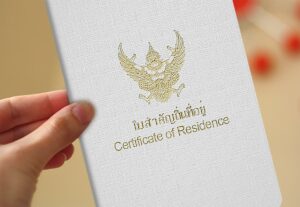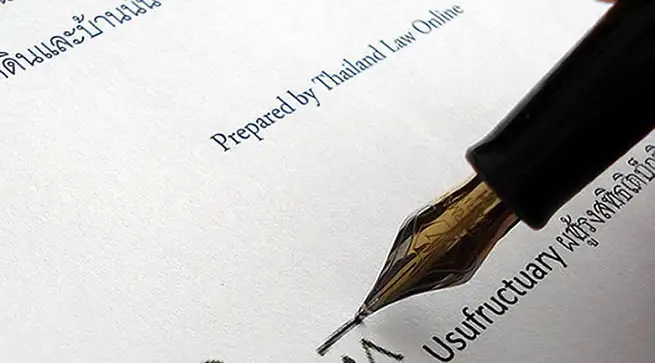Usufruct in Thailand. A usufruct is a legal arrangement in Thailand that allows an individual (usufructuary) to use and derive benefits from another person’s land for a specified period while the ownership remains with the landowner. Governed under the Civil and Commercial Code of Thailand (Sections 1417–1428), usufruct agreements are a practical solution for foreigners and businesses seeking long-term land use without ownership rights.
1. Key Features of a Usufruct
- Right to Use and Benefit:
- The usufructuary can live on, lease, or utilize the land for personal or commercial purposes, depending on the agreement terms.
- Ownership Retention:
- The landowner retains full ownership but cannot interfere with the usufructuary’s lawful use.
- Duration:
- A usufruct can be granted for a specific term or the lifetime of the usufructuary. Lifetime usufructs automatically terminate upon the usufructuary’s death.
- Transferability:
- A usufruct cannot be sold or transferred to another party but can include leasing rights to third parties if explicitly permitted in the agreement.
2. Usufruct for Foreigners
- Ownership Restrictions:
- Since foreigners cannot directly own land in Thailand, a usufruct offers a viable way to use and benefit from land legally.
- Residential Use:
- Common among foreigners married to Thai nationals, usufructs allow long-term use of marital property without ownership rights.
- Commercial Use:
- Foreign investors can secure usufructs for agricultural projects, resorts, or other ventures, provided the landowner agrees.
3. Establishing a Usufruct Agreement
- Drafting the Agreement:
- The usufruct must clearly define the rights and responsibilities of both parties, including usage scope, maintenance obligations, and termination conditions.
- Registration at the Land Office:
- The usufruct agreement must be registered with the local Land Office to be legally binding and enforceable.
- Both parties must be present with necessary documentation, including:
- Original title deed (Chanote).
- Identification documents.
- Signed usufruct agreement.
- Fees:
- Registration fees are minimal, typically based on the land value and local Land Office policies.
4. Rights and Responsibilities
4.1 Rights of the Usufructuary
- Use and Enjoyment:
- Full rights to use the land, including living, farming, or renting it out, as permitted.
- Improvements:
- Allowed to build or improve structures, but these revert to the landowner upon usufruct termination unless otherwise agreed.
4.2 Responsibilities of the Usufructuary
- Maintenance:
- Responsible for maintaining the property in good condition.
- Taxes and Costs:
- Typically liable for land taxes and other operational costs unless specified otherwise.
5. Termination of a Usufruct
- Expiration of Term:
- Ends at the agreed term or upon the usufructuary’s death if it is a lifetime agreement.
- Mutual Agreement:
- Can be terminated early if both parties consent.
- Breach of Agreement:
- Significant violations, such as illegal use, may lead to termination by the landowner.
- Abandonment:
- If the usufructuary abandons the land, the usufruct may be voided.
6. Advantages and Disadvantages
Advantages:
- Legal Security:
- Provides long-term use rights without transferring land ownership.
- Flexibility:
- Can be tailored for personal or commercial purposes.
- Inheritance Protection:
- Offers security for foreign spouses or dependents using marital property.
Disadvantages:
- Non-Transferable:
- Cannot be sold or inherited by the usufructuary’s heirs.
- Termination Risk:
- Ends automatically upon the usufructuary’s death.
- Limited Scope:
- Must align strictly with the agreed terms and cannot extend to ownership.
7. Practical Considerations
- Legal Assistance:
- Engaging a qualified Thai lawyer ensures compliance with local laws and helps draft robust agreements.
- Title Verification:
- Verify the land title (Chanote) to confirm the owner’s right to grant a usufruct.
- Negotiation of Terms:
- Clearly define permitted activities, maintenance obligations, and other specifics to avoid disputes.
Conclusion
A usufruct in Thailand is a practical legal arrangement for foreigners and businesses seeking long-term land use without ownership. While it offers significant benefits and flexibility, careful drafting, registration, and compliance with agreed terms are essential. By leveraging this legal tool, individuals and entities can enjoy secure land rights while navigating Thailand’s property regulations effectively.
You might also enjoy

Thai Business Partnership
A Thai business partnership is one of the most commonly

Thailand Permanent Residency
Thailand Permanent Residency (PR) is a highly sought-after immigration status

Child Custody in Thailand
Child custody in Thailand is governed by the Civil and


